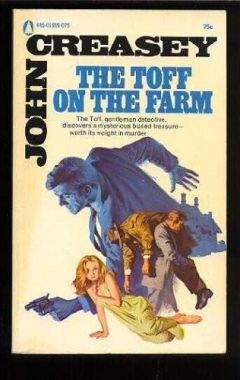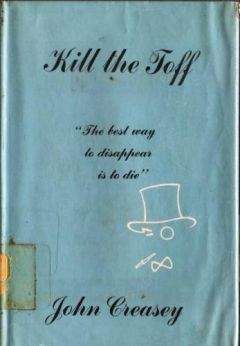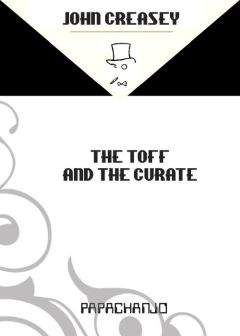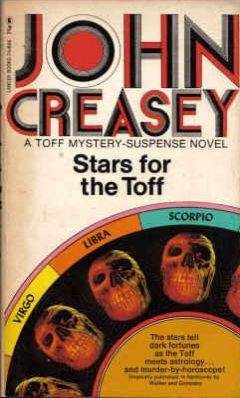John Creasey - The Toff and The Lady
На сайте mybooks.club вы можете бесплатно читать книги онлайн без регистрации, включая John Creasey - The Toff and The Lady. Жанр: Прочее издательство неизвестно,. Доступна полная версия книги с кратким содержанием для предварительного ознакомления, аннотацией (предисловием), рецензиями от других читателей и их экспертным мнением.
Кроме того, на сайте mybooks.club вы найдете множество новинок, которые стоит прочитать.
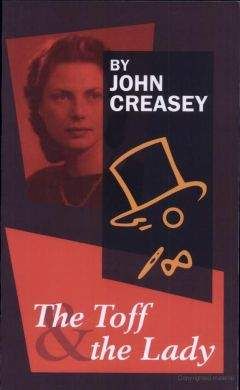
John Creasey - The Toff and The Lady краткое содержание
The Toff and The Lady читать онлайн бесплатно
“Quite a birthday for the police!” said Rollison.
“I wish you wouldn’t behave like this,” said Grice. “You can’t always be right, you know. The truth is”
“The truth is that you think you’ve come to the end,” said Rollison, “and this is how you’ve worked it out.” He did not give Grice a chance to interrupt, but talked swiftly. He put the case which Jolly had outlined, but in fewer words and with more telling effect, and he could see that Grice, if not actually astonished, grew more surprised as each item in the indictment against Barrington-Ley and the Countess unfolded.
Rollison spared himself nothing, and even mentioned the love-letter which Gwendoline had found.
When he had finished, Grice said:
“If you were advancing your own opinions and not guessing mine, I would still call it miraculous!”
“They’re Jolly’s opinions,” said Rollison. “Have you got anything to support such a case?”
“Yes,” said Grice. “Jolly was always more stable than you.”
“Never mind Jolly—let’s have your case,” said Rollison.
One half of his mind was paying close attention to what Grice said; the other was busy with thoughts of Lila, Countess Hollern. He thought she knew that he had not wanted to talk in front of her, and was therefore staying in her room. It was painful to think of her, and it grew more painful as Grice went on.
“Both firms of Pomeroy, Ward & Pomeroy are deeply involved,” said Grice. “Your Pomeroy is actually a partner of the accountants, although the others once denied any knowledge of him. The firm is handling the accounts of the Relief Fund, as I’ve said, and into the firm’s account all the American money was paid.”
“Ah,” said Rollison.
“Early this year,” Grice continued, “Barrington-Ley suddenly changed his accountants. He had employed the same firm for many years, but he transferred to Pomeroy, Ward & Pomeroy. On the firm’s statement, the accounts are in very bad order. Fat Pomeroy agrees, and says that Barrington-Ley knew it. His purpose was to get Pomeroy’s to produce accounts which would appear satisfactory. The Relief Fund money was to help to stabilize the position.”
“Wholesale falsification of accounts,” murmured Rollison.
Yes. There can’t be any reasonable doubt about it.”
“Fat Pomeroy denied any share in the firm, and the firm denied him.”
“That isn’t a crime in itself,” said Grice. “He told me that until the last moment he hoped Barrington-Ley would be able to put his affairs in order. He—fat Pomeroy—became involved, and decided to try to cover up the shortages. The rest followed naturally.”
“It could be the answer,” Rollison said. “Have you seen the accounts?”
“Not yet, but we’re applying for a Court Order to see them as well as the various banking accounts.”
“So you’re relying on fat Pomeroy’s word.”
“Why on earth should he lie at this juncture?” demanded Grice. “Shayle supports him in every statement, and their statements were made independently. Malloy knows little about it, apparently he was employed to supply violence when necessary. He employed the painter at Miss Armitage’s flat— yes, you were right about that, they wanted her dead. They don’t admit intent to murder, of course, only to frighten.”
“Why frighten?”
“They thought Janice Armitage had told her sister where to find Marcus Shayle, and in any case she could incriminate Shayle—as she did. Once we knew her story, the rest came logically. They were right to want her out of the way if they were to save themselves.”
“Yes,” said Rollison. “But there’s an answer to your earlier question—why should Pomeroy and Shayle lie at this juncture? Neither lies nor the truth will save them from punishment, but a confession, talk of King’s Evidence, putting the principal blame on Barrington-Ley—all those will help them.”
“Nonsense! They’ve practically admitted complicity in murder!”
“Oh, my dear chap,” said Rollison. “There was no murder until the matron’s. Has Malloy talked?”
“No.”
“But they’ve admitted they used him to provide the strong-arm men, you say. They’ll doubtless insist that he was instructed not to commit murder”
“They won’t get away with that,” interrupted Grice. “They’ve gone too far in their admissions.”
“Don’t forget that unless they killed the matron, which doesn’t seem likely, there’s no murder charge against them,” said Rollison. “They’re safe enough on that. They’re putting the blame on to Barrington-Ley, standing together to negate his evidence. Now you’ve got them, it’s their only wise course. But never mind, you’ve got your case, short of the matron’s murder. Let’s leave the sore subject of who killed her. When will you be able to examine the accounts?”
“This evening, I expect.”
“You can falsify accounts two ways,” said Rollison. “You can make good ones seem bad, as well as bad ones seem good. Don’t forget that.”
“I’ve never known you quite like this,” said Grice. “It isn’t any use trying to deny the facts.”
“I question their accuracy,” Rollison said. “There are two people in whom I believe—the Countess and Barrington-Ley. They are not, in my view, people who would become involved in such an affair as this of their own free will. That’s the issue, and your answer is different from mine.”
“Very different, apparently,” said Grice.
Rollison said: “And now you want to arrest the Countess for conspiring with Barrington-Ley, I suppose?”
“I must take her along with me,” said Grice, evasively.
“On a charge of conspiring to defraud?”
“I haven’t got as far as that yet.”
“I’m glad that you’re wideawake enough for that,” said Rollison, sitting up and pushing the eiderdown back. “You certainly haven’t got as far, you haven’t a charge of any kind which you can prefer against her. Pretending to having lost her memory? You might construe it into being a public nuisance but if I were you I wouldn’t try. Poisoning herself? Even you don’t believe she tried to commit suicide. And everything else that has happened in England in this affair took place when she was at the nursing home with a sound alibi, an alibi your own men provided, or else here, with one that the maid, Jolly, or I can provide. On the evidence of one letter and some gossip you can assume that she was having an affair with Barrington-Ley, but that’s no crime. Oh, take her along with you, old chap! Go through the motions of charge and arrest, and I’ll be on the doorstep with a complaint of wrongful detention before you can say knife.”
“Now, Rolly”
“Now Rolly be damned!” said Rollison. “Where are my trousers?” He took them from a chair. “I’ve warned you.” He sat down and pulled on his trousers, staring at Grice all the time. “Wrongful detention after you’ve been warned is serious. You haven’t a case, you know as well as I do that if you take her up before the magistrate you’ll get sharp words from the gentleman, unless you’ve a lot more to go on than you’ve told me.”
Grice’s expression told him that he had not.
“And there is another thing,” said Rollison, vehemently. “The police are no fools, but sometimes they have been fooled. You are being properly and completely diddled. On the evidence of a well-known East End crook who hires-out strong men for any beastly job that offers, of Pomeroy, a renegade solicitor-cum-accountant, and Marcus Shayle, himself detained on a charge of attempted murder, you’re assuming that Barrington-Ley is guilty of all manner of heinous crimes. Why? Only because it fits your own theory.”
“He hasn’t said a word in his own defence.”
“I should think not! David’s a good fellow, he would give you a chance of apologizing nicely and withdrawing the charge before he started to point out how completely you’ve been fooled. Where’s my coat?” He finished tying his tie, put on his coat and went on talking rapidly. “I’m serious. Unless you’re keeping something back, or are taking steps to extradite the Countess, you’ll arrest or detain her at your own risk and against all the opposition I can rake up—be it fair or foul!”
Grice said: “If I’d wanted further evidence against Barrington-Ley, I would have it in your story of the love-letter written to him by the Countess.” He was deliberately brutal.
“Bah.”
“Did you or did you not tell me about that letter?”
“I did. Here, I’ll show it to you.” Rollison tossed the letter to Grice, and waited while he read it through, and there was a curious expression in his eyes as he watched. He seemed almost elated.
Grice handed it back, but said:
“I shall probably need that as evidence.”
“That’s fine,” said Rollison, refusing to take it. “Use it as evidence! Try to get any conviction of any kind on the strength of it. Why, you addlepate, David Barrington-Ley’s name isn’t even mentioned! It was in his possession, or rather found behind his dressing-table, but there isn’t any evidence at all he received it or read it. Why shouldn’t my lady write to her beloved? I tell you that if you arrest or detain her, I’ll move heaven and earth to prove you a complete fool.”
“I shall leave the maid with her,” Grice said, after a long pause, “and I shall have her closely followed if she leaves this flat.”
Rollison raised his hands and beamed. He was almost gay, something had put new life into him.
“Threat withdrawn?”
“You know perfectly well that I can’t take her with me if you’re going to act like that,” said Grice. “I don’t think much of it, Rolly. You’re taking advantage of the fact that I told you what I was going to do.”
Rollison said: “Now be reasonable! I gave you good warning. I don’t want you to make a fool of yourself and the police force, and when this affair really breaks you’ll agree that it was a good thing. Er—seriously, now.”
“Well?” said Grice.
“What happened at the nursing home?”
Grice said, grudgingly. “Phyllis Armitage went to see the matron, at the matron’s request, and she found the matron dead.”
“By poisoning?”
“Yes.”
“Is Phyllis under suspicion?”
“No. The poison must have been taken an hour before she arrived. Barrington-Ley is under suspicion. He was there.”
“Poor David!” said Rollison. “Well, old chap, I don’t want you to feel that you’re not welcome, but I’ve a call to make. Stay here if you like, of course, I’ll trust you not to worry the Countess.”
“Where are you going?” demanded Grice.
“To see Phyllis Armitage?”
“Why?”
“Because I think they may have wanted to kill her for more reasons than one,” said Rollison, “and because she may know why, without realizing it.”
“I hope you don’t make a mistake,” Grice said. He followed Rollison out of the room, and they went to the front door. Before Rollison opened it, Grice turned and said with unusual seriousness: “Rolly, did you know the Countess before this started?”
“Great Scott, no!”
“Are you sure?” demanded Grice.
“I am quite sure,” said Rollison. “What makes you doubt it? I had her photograph, but I’ve told you about that.”
“I don’t mean her photograph,” said Grice. “I can’t believe that a woman whom you’ve known for such a short time would affect you like this.”
Rollison said: “Odd, isn’t it? I can hardly believe it myself! And that reminds me, I must tell her that I’m going out.”
He felt not only less on edge but possessed by an almost feverish excitement. Nothing seemed quite normal—except the smile with which the Lady of Lost Memory greeted him when he opened the door. She was sitting by the window, reading; the “maid” was opposite her, sewing.
“Are you better, so soon?” she asked.
“I was never really ill.” said Rollison. “Don’t get up.” He stepped across the room as she stood up, and shifted her chair. “But don’t sit so that you can be seen from the street,” he said. “And remember this—if anyone, any one asks you questions, even your maid, don’t answer. Don’t answer any kind of question put to you by anyone except me.”
“If you insist upon it, I will not,” she said, but she was puzzled and no longer smiling. “What troubles you, Mr. Rollison?”
“Unpleasant people,” said Rollison.
Downstairs, actually in the hall of the building, one of Grice’s men saluted him. In the street were two other men, and to one of them Grice, leaning out of his car, was talking earnestly. Rollison went the other way, soon found a taxi, and within twenty minutes he was walking up the stairs leading to Phyllis Armitage’s flatlet. The painters had finished, and the new paint was already scratched in places.
Phyllis herself answered his knock. She did not look particularly surprised, but asked him in.
“I suppose you’ve seen the police,” she said.
“Yes, and we’re not friends,” said Rollison. “Miss Armitage, I haven’t much time and I must have the answer to a single question before I go.”
“If I know the answer, I’ll tell you,” she promised.
“Think back to the afternoon when you left the nursing home.”
She frowned. “Yes.”
“The matron had tea with the patient, and the poison was administered before tea—that’s right, isn’t it?”
“Yes, so I was told.”
“You left the room about half-past three.”
“It was a little earlier.”
“Who came into the room before you left? I don’t mean Marcus Shayle, I mean who else on the staff or connected with the nursing home.”
“No one,” said Phyllis, eyeing him steadily.
“Are you quite sure?” demanded Rollison. “I mean, someone who had every right to be there, whose presence you would not perhaps notice specially, who always came about that time, who” He broke off, and there was a glint in his eyes. “Ah, you’ve remembered! Who was it?”
She said slowly: “Dr. Renfrew came in.”
“Did he send you out at all?”
“I had to take a message to the matron, yes.”
“So Renfrew was with her alone,” said Rollison, and there was a great relief in his mind. “That’s splendid! You’re prepared to swear to it?”
“Of course. He came every afternoon about that time, I didn’t really notice it. I am quite sure there was no one else.”
“That’s fine,” declared Rollison. “I think I’ll call that a day. Will you write that statement down and sign it?”
“Of course,” she said, now really puzzled, “but what has Dr. Renfrew to do with it?”
“More than we realize yet,” said Rollison.
He watched her as she wrote swiftly, signed what she had written, blotted it and handed it to him. He tucked the statement into his wallet, and turned to go. She followed him, and said in a low-pitched voice:
“Mr. Rollison, is my sister in serious trouble?”
“I don’t think so,” said Rollison. “Why?”
Похожие книги на "The Toff and The Lady", John Creasey
John Creasey читать все книги автора по порядку
John Creasey - все книги автора в одном месте читать по порядку полные версии на сайте онлайн библиотеки mybooks.club.
